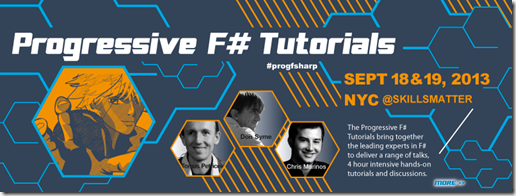Developer conferences are a great way to learn about new and existing technologies. Almost as important are the conversations in the corridors between talks and bars after to find out what your peers from other companies are up to. Without them your company may run the risk of becoming like a small island cut off from the mainland, perpetuating a monoculture.

But there are a bewildering array of conferences to choose from, and for most of us only a limited time and budget to work with. Here’s a few tips.
Talks
The most common format is a few days of talks, usually spread across a number of themed tracks with each talk lasting somewhere between half an hour and an hour.
I try to get to a handful of conferences a year, which is in part made possible by speaking at some of the them. If you’re speaking typically the entrance fee is waived and if the conference is remote then often the organizer will contribute towards your travel and accommodation. Don’t expect too much though, unless you’re giving a keynote you shouldn’t expect to get paid, so for the most part speakers are giving their time freely.
A talk lets the speaker really emphasise what they think is important when introducing a subject, something that is much harder to portray in an article. I recommend choosing a few talks out of your normal area/comfort zone, often you’ll learn something new and interesting and sometimes even applicable. Don’t expect to become an expert after listening to a one hour talk, at best you might get two or three key concepts which you can build on in your own time.
Training
Many of the large conferences tag half day training sessions at the start of the conferences. This can be a good way to deep dive in to a particular topic and get some hands on experience with the help and support of an expert. Some conferences specialize in this kind of training like Skills Matter’s Progressive .Net Tutorials and Progressive F# Tutorials which are comprised almost entirely of half day hands on sessions.
Hackathons
One or two day hacking events are another popular event style. They are often free and typically run over the weekend so those no need to use up your precious holiday days. As an example the Data Science London meetup recently organized a Big Data Hackathon and next weekend Skills Matter are hosting the London GameCraft game jam.
Big Conferences
For me more interesting things happen at the edges between disciplines, so here I’m going to call out mostly multi-disciplinary conferences:

Strangeloop, if I had to recommend one conference, this would be it, this year your can see the author of Godel, Escher, Bach: an Eternal Golden Braid, Douglas Hoftadter speaking.
QCon/GOTO/Yow! conferences organized by Trifork, the team behind InfoQ, with events in San Francisco, New York, London, Aarhus, Amsterdam, Melbourne and Brisbane. I’ve attended in QCon London and a GOTO in Denmark, both were well organized with some great speakers
NDC Oslo attracted 1,600 developers this year. This conference is on my must see list, maybe next year. NDC London launches in December.
ØREDEV is based in Malmö Sweden, and attracts around 1,200 developers, this year the theme is the Arts and I’ll be giving not just one but two talks.
Build Stuff is organized by Greg Young, and based in Lithuania, it has a fantastic line-up.
MonkeySpace – there seems to be a real buzz around these conferences which focus on open source multi-platform development with .Net
If you can I’d recommend trying at least one new conference each year, this way you’ll be more likely to get exposure to new people and ideas.
Functional Conferences
Each programming language has their own conferences, for example Scala has Scala Days and the Scala eXchange (which I’ll be speaking at in December), Clojure has Euro Clojure and ClojureWest and F# has the Progressive F# Tutorials in London and New York (I’ll be there too). There are also a number of cross-language events if you’re looking to broaden your horizons:

Lambda Jam ran in July in Chicago with a really strong line up organized by the team behind Strangeloop,
TechMesh, now CodeMesh, was a big hit in London last December, expect it to be even bigger this year.
FP Days is in its 3rd year, based in Cambridge (England), it’s a friendly intimate event.
FP eXchange is organized by Rob Pickering and brings together the London FP community.
flatMap is based in Oslo and has been running for 2 years now.
Other Conferences
Fancy trying something a little different:

That Conference is a conference and a summer camp.
CodeMash at the same location as that conference, for winter it boasts an indoor waterpark.
DDD – referencing Steve Balmer’s Developers Developers Developers chant, these free UK conferences are organized by the developer community.
Bacon is a conference on things developers love with sessions on topics including rocketry, Go, infinity, data visualisation, and continuous deployment.
GDC (Game Developers Conference) has tracks for design, production, programming and visual arts.
NIPS (Neural Information Processing Systems) you’ll learn about some really interesting machine learning projects, both research based and applied.
Conference Planner

| Spring | Summer | Autumn | Winter |
| QCon London | NDC Oslo | Strangeloop | Build Stuff |
| FP eXchange | MonkeySpace | ØREDEV | NDC London |
| GOTO Copenhagen | Lambda Jam | QCon San Francisco | CodeMesh |
| GDC | GOTO Amsterdam | GOTO Aarhus | CodeMash |
| Bacon | QCon New York | FP Days | NIPS |
| flatMap | That Conference | | |
I’d love to hear your event ideas and suggestions too.
